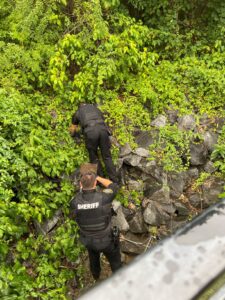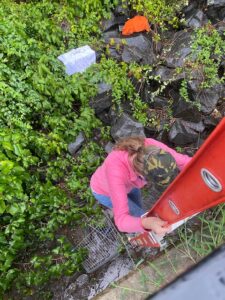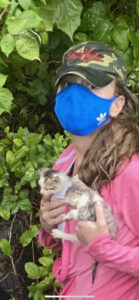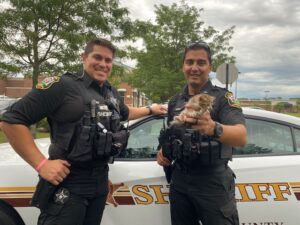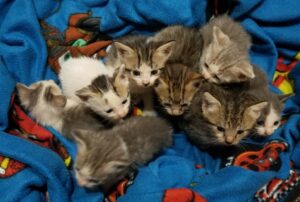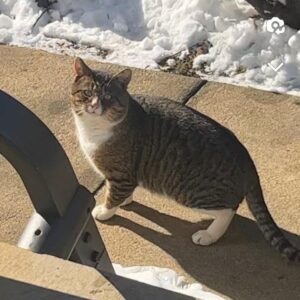
By Lauren Puckett
Volunteers who feed and monitor the well-being of feral cat colonies are called Community Cat Caretakers. One of our caretakers shared this feel-good story about a community cat named Toby.
Double Dipping
In January 2024, HSLC received two separate requests for Trap-Neuter-Return (TNR) for cats at two different colony sites. The cat at one site was not a regular; they called him “Chunky” due to his portliness. The cat at the other site was named “Toby” and his caretaker, Michael, was slowly making friends with him. Well, it turns out that Chunky and Toby were the same cat! At 14-pounds, this resourceful kitty had been “double-dipping” by feeding at both sites.
Fast forward to February, Toby was neutered, vaccinated, and microchipped through HSLC’s TNR program. When he returned, Michael asked if he could give Toby the opportunity to adjust to life as a house cat. If the indoor life didn’t work out, Toby could go on being loved and cared for in Michael’s backyard.
Adjusting to the Indoor Life
Toby was scared at first given his new surroundings. And, he often wanted to be alone which made socializing the handsome boy a challenge. But, Michael was patient and spent as much time with him as possible even when the cat didn’t reciprocate the attention.
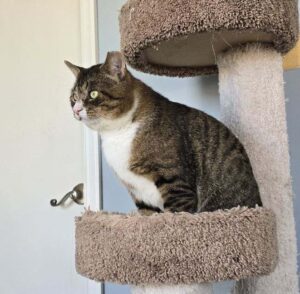
Within a month, Michael’s persistence paid off and Toby was loving his new life as a homebody. He has become very friendly, sweet, and grateful for his happy ending!
While it is true that not all cats belong inside – there are many cats that deserve a chance at the indoor life. Check out the HSLC adoption page to learn about several formerly outdoor cats hoping to follow in Toby’s paw-prints.
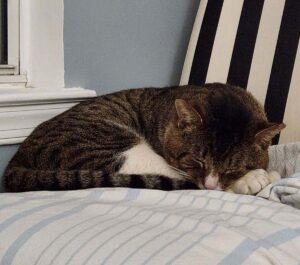
Also, if you are interested in becoming a Community Cat Caretaker, get started by completing an application on our website. On-site training is available.
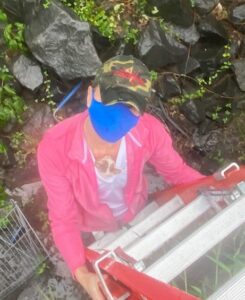
By Sharon Nylec
Our story begins as they all do. Jenn Reed, TNR/feral kitten specialist and long-time volunteer for the Humane Society of Loudoun County, got a call about some kittens in a ravine behind a Harris Teeter shopping center. When Jenn arrived to assess the situation, it was a lot more difficult than she thought it would be. The kittens were located in a very precariously located pile of rocks which was 10 or 12 ft below street level. Next to the rocks was a stream that was definitely built to catch storm water runoff, and the forecast said we were going to get some big storms for the next couple of days.
The kittens were in a dangerous spot. There really was no other way to get to them without a ladder. So Jenn called her step dad, Mike, and he rushed right over with an extension ladder. He held it while Jenn climbed down into “Kitten Canyon”.
Now, this scene apparently looked suspicious to the good shoppers of Harris Teeter. I mean, no good can come from masked people who show up with tuna and traps. They weren’t sure what law we were breaking, but Jenn and I were looking (and smelling, thanks to the tuna) a little fishy so they decided they better call Loudoun’s finest to assess the situation. Pretty soon, two cars from the Loudoun County Sheriff’s Office (LCSO) rolled up. As soon as Jenn explained there were helpless kittens in a ravine and that a big storm was coming, Deputy Torres and Deputy First Class Chenari were ready to shift into rescue mode.
A gentle rain began to fall, a harbinger of the deluge to come. With all eyes on the gloomy sky, Jenn and the deputies got to work with carriers, flashlights, and bite gloves. Meanwhile, I stood with them in the rain playing a video of a mama cat over and over hoping the sound would calm the kittens and lure them out of hiding. Not long after we put our minds to it, we liberated the first baby kitten from the cave underneath the rock pile. That moment was like uncorking a bottle of kitten champagne, because in the next hour–in lightning, thunder, and steady rain– seven more kittens came trundling out of the rock hole/cave to see where their brothers and sisters had gone.
Duty called and the deputies had other matters to attend to. So they didn’t get to see what happened after they pulled the first baby out from under the rocks. But that’s exactly what started the ball rolling. Plus, there was this dedicated HSLC volunteer with bull dog tenacity, and unparalleled rock-scrambling ability: Thanks Jenn for sticking it out in cruddy weather and for saving 8 more little lives!
In closing, it is a FACT that kittens born outdoors are never anywhere convenient. So, that is why you may find HSLC volunteers lurking in back allies, ravines, dark spooky woods or next to garbage dumpsters on a Saturday night. It’s okay, you can call the cops on us, we like recruiting new friends and volunteers. Speaking of which, thanks again to Deputies Torres and Chenari for uncorking the kitten genie bottle!
- C’mon out little buddies!
- Jenn descending into Kitten Canyon
- Last two and now the kitten genie bottle is corked!
- Good job, Deputies!
- 8 little lives saved!

